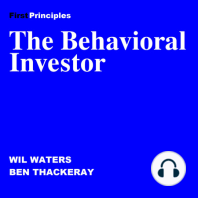32 min listen

S3E4 ? Being Intelligent about Emotions with Nick Mishkin
S3E4 ? Being Intelligent about Emotions with Nick Mishkin
ratings:
Length:
42 minutes
Released:
Jul 25, 2021
Format:
Podcast episode
Description
Nick is doing an MA in behavioral economics at IDC Herzliya (https://www.idc.ac.il/en/schools/rris/pages/behavioral-economics.aspx). We reached out to him for an interview because he curates the Behavioural Economics podcast playlist (https://open.spotify.com/playlist/2qVC324gaGLfO9HVoSddNv?si=hg8DUYx0QKGnEliXZ_nYiQ&nd=1). As it happens, he’s also been interviewed on Merle’s blog (https://www.moneyonthemind.org/post/interview-with-nick-mishkin), whom we interviewed recently ourselves! Yes, we’ve reached that stage of penetrating the behavioral finance landscape. Have a read of the reference list below for the topics he covered in this interview. The most useful point for our mission to understand why no one executes on Ben's Billion Dollar Compounding Plan is futured language, the first study below by Keith Chen.
REFERENCES
Chen, M. K. (2013). The effect of language on economic behavior: Evidence from savings rates, health behaviors, and retirement assets. American Economic Review, 103(2), 690-731. Accessed 24/7/21: https://www.jstor.org/stable/pdf/23469680.pdf.
Crosby, D. (2018). The Behavioral Investor. Harriman House. Accessed 24/7/21: https://www.amazon.co.uk/Behavioral-Investor-Daniel-Crosby/dp/0857196863.
Danziger, S., Levav, J., & Avnaim-Pesso, L. (2011). Extraneous factors in judicial decisions. Proceedings of the National Academy of Sciences, 108(17), 6889-6892. Accessed 24/7/21: https://www.pnas.org/content/pnas/108/17/6889.full.pdf?nr_email_referer=1%29%2C.
Levav, J., & Argo, J. J. (2010). Physical contact and financial risk taking. Psychological Science, 21(6). Accessed 24/7/21: https://journals.sagepub.com/doi/abs/10.1177/0956797610369493.
Levav, J., & McGraw, A. P. (2009). Emotional accounting: How feelings about money influence consumer choice. Journal of Marketing Research, 46(1), 66-80. Accessed 24/7/21: https://journals.sagepub.com/doi/pdf/10.1509/jmkr.46.1.66.
Matsumoto, D., & Willingham, B. (2006). The thrill of victory and the agony of defeat: spontaneous expressions of medal winners of the 2004 Athens Olympic Games. Journal of personality and social psychology, 91(3), 568. Accessed 24/7/21: https://citeseerx.ist.psu.edu/viewdoc/download?doi=10.1.1.491.414&rep=rep1&type=pdf.
Simonsohn, U. (2007). Clouds make nerds look good: Field evidence of the impact of incidental factors on decision making. Journal of Behavioral Decision Making, 20(2), 143-152. Accessed 24/7/21: https://onlinelibrary.wiley.com/doi/pdf/10.1002/bdm.545.
Thaler, R. H. (1999). Mental accounting matters. Journal of Behavioral Decision Making, 12(3), 183-206. Accessed 24/7/21: https://onlinelibrary.wiley.com/doi/abs/10.1002/%28SICI%291099-0771%28199909%2912%3A3%3C183%3A%3AAID-BDM318%3E3.0.CO%3B2-F.
---
Send in a voice message: https://anchor.fm/the-behavioral-investor/message
REFERENCES
Chen, M. K. (2013). The effect of language on economic behavior: Evidence from savings rates, health behaviors, and retirement assets. American Economic Review, 103(2), 690-731. Accessed 24/7/21: https://www.jstor.org/stable/pdf/23469680.pdf.
Crosby, D. (2018). The Behavioral Investor. Harriman House. Accessed 24/7/21: https://www.amazon.co.uk/Behavioral-Investor-Daniel-Crosby/dp/0857196863.
Danziger, S., Levav, J., & Avnaim-Pesso, L. (2011). Extraneous factors in judicial decisions. Proceedings of the National Academy of Sciences, 108(17), 6889-6892. Accessed 24/7/21: https://www.pnas.org/content/pnas/108/17/6889.full.pdf?nr_email_referer=1%29%2C.
Levav, J., & Argo, J. J. (2010). Physical contact and financial risk taking. Psychological Science, 21(6). Accessed 24/7/21: https://journals.sagepub.com/doi/abs/10.1177/0956797610369493.
Levav, J., & McGraw, A. P. (2009). Emotional accounting: How feelings about money influence consumer choice. Journal of Marketing Research, 46(1), 66-80. Accessed 24/7/21: https://journals.sagepub.com/doi/pdf/10.1509/jmkr.46.1.66.
Matsumoto, D., & Willingham, B. (2006). The thrill of victory and the agony of defeat: spontaneous expressions of medal winners of the 2004 Athens Olympic Games. Journal of personality and social psychology, 91(3), 568. Accessed 24/7/21: https://citeseerx.ist.psu.edu/viewdoc/download?doi=10.1.1.491.414&rep=rep1&type=pdf.
Simonsohn, U. (2007). Clouds make nerds look good: Field evidence of the impact of incidental factors on decision making. Journal of Behavioral Decision Making, 20(2), 143-152. Accessed 24/7/21: https://onlinelibrary.wiley.com/doi/pdf/10.1002/bdm.545.
Thaler, R. H. (1999). Mental accounting matters. Journal of Behavioral Decision Making, 12(3), 183-206. Accessed 24/7/21: https://onlinelibrary.wiley.com/doi/abs/10.1002/%28SICI%291099-0771%28199909%2912%3A3%3C183%3A%3AAID-BDM318%3E3.0.CO%3B2-F.
---
Send in a voice message: https://anchor.fm/the-behavioral-investor/message
Released:
Jul 25, 2021
Format:
Podcast episode
Titles in the series (27)
S1E1 Putting Ben to Work by The Behavioral Investor